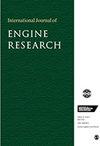贫燃条件下前置燃烧室天然气发动机燃烧不稳定性特征的实验研究
IF 2.1
4区 工程技术
Q2 ENGINEERING, MECHANICAL
引用次数: 0
摘要
前腔喷射点火是未来高效天然气(NG)发动机的一项关键技术。它可以通过出色的点火性能实现快速稳定的燃烧。然而,该技术仍面临一些挑战,如接近贫燃极限时燃烧不稳定性较高以及发动机工作范围较窄等。因此,本文通过实验方法研究了超稀释条件下前室 NG 发动机的燃烧不稳定性。在两种发动机负荷下,采用不同的喷气点火强度方案进行实验,研究喷气点火强度对循环燃烧变化的影响。然后,通过循环变化分析和相空间重构研究了前室 NG 发动机的燃烧不稳定性特征。结果表明,随着射流点火强度的增加,循环燃烧变化减小,指示平均有效压力的循环变化系数减小到 2% 以下。前置腔天然气发动机的贫燃极限扩大到过量空气比 2.0。前室天然气发动机运行不稳定的主要原因是点火和燃烧过程的周期性变化。非线性动力学分析表明,在喷气点火强度较低的运行条件下,贫燃前室天然气发动机的燃烧过程表现出混沌特性。随着喷气点火强度的增加,燃烧稳定性得到改善,周期与周期之间的变化从相当确定的行为转变为更多的随机行为。燃烧过程的混沌特性变得越来越弱。总之,产生稳定的高点火强度射流对于降低燃烧不稳定性和提高贫燃前室 NG 发动机的燃烧效率具有重要意义。本文章由计算机程序翻译,如有差异,请以英文原文为准。
Experimental study on combustion instability characteristics in a pre-chamber natural gas engine under lean burn conditions
Pre-chamber jet ignition is a key technology for future high-efficiency natural gas (NG) engines. It can achieve fast and stable combustion through excellent ignition performance. However, there are still some challenges, such as high combustion instability near the lean burn limit and the narrow engine operating range. Therefore, this paper investigates the combustion instability of a pre-chamber NG engine under ultra-diluted conditions by experimental method. At two engine loads, experiments are carried out with different jet ignition intensity schemes to study the effect of jet ignition intensity on the cyclic combustion variations. Then, the combustion instability characteristics of the pre-chamber NG engine are studied by cyclic variation analysis and phase space reconstruction. The results show that with the increase in the jet ignition intensity, the cyclic combustion variations decrease, and the cyclic variation coefficient of the indicated mean effective pressure decreases to below 2%. The lean burn limit of the pre-chamber natural gas engine is extended to an excess air ratio of 2.0. The operation instability of the pre-chamber NG engine is mainly due to cyclic variations in the ignition and combustion process. The nonlinear dynamic analysis shows that the combustion process in the lean burn pre-chamber NG engine behaves with chaotic characteristics under the operating conditions of low jet ignition intensity. As the jet ignition intensity increases, the combustion stability is improved and the cycle-to-cycle variations change from fairly deterministic to more stochastic behavior. The chaotic characteristics of the combustion process become weaker. In conclusion, it is of great importance to generate stable and high ignition intensity jets for reducing combustion instability and improving combustion efficiency in lean burn pre-chamber NG engines.
求助全文
通过发布文献求助,成功后即可免费获取论文全文。
去求助
来源期刊

International Journal of Engine Research
工程技术-工程:机械
CiteScore
6.50
自引率
16.00%
发文量
130
审稿时长
>12 weeks
期刊介绍:
The International Journal of Engine Research publishes high quality papers on experimental and analytical studies of engine technology.
 求助内容:
求助内容: 应助结果提醒方式:
应助结果提醒方式:


